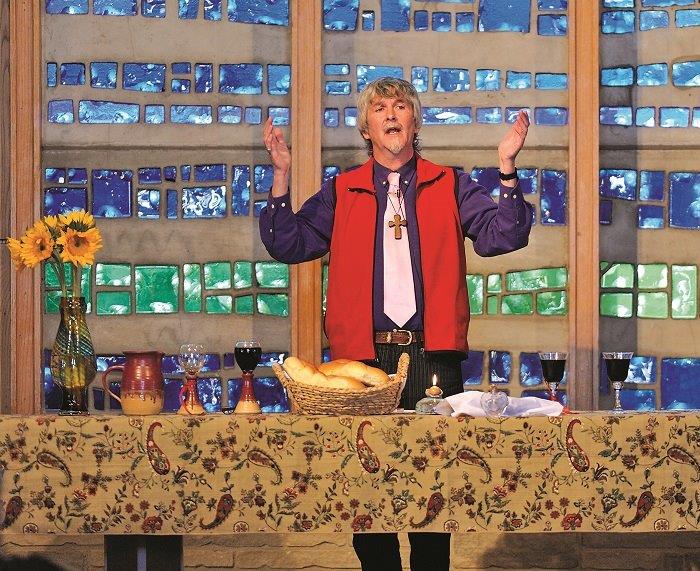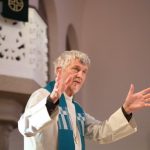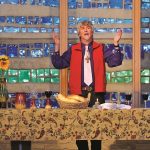We know that Jesus was a storyteller, but was Jesus funny? Is there humour in the Bible?
Rev John Bell, international theologian, musician and social justice advocate, thinks so, and will be in the country soon to tell us why. He’ll be setting off on an Australian and New Zealand tour in May. Despite the challenging time difference from WA, John shared some of his passions for the church, from his home base of Glasgow, Scotland.
John has been a member of the Iona Community for 50 years. On top of that he’s worked for the community as a resource worker in the areas of worship, spirituality and social justice. He’s also a published author, a regular radio broadcaster and a songwriter of many hymns – some of which we regularly use in worship here in the Uniting Church WA.
The Iona Community is an ecumenical intentional Christian community in Scotland. It’s a religious tourist destination for Christians the world over who are inspired by their call to action for living a just life. Through reflection, prayer and action, members of the Iona Community work towards peace and social justice, as well as building community and a renewal of worship.
John will be presenting two workshops and two lectures in Perth, hosted by the ‘Hills Anglicans’ – the Worshipping Community of Darlington-Bellevue of the Anglican Diocese of Perth.
While he’s quite well-known for his hymns, John is humble about his musical talents. Inspired largely by folk music, he originally started writing songs with a colleague as a way to connect with young people in his first job as a youth worker. He hasn’t written any music in a while, but said that people often talk to him about how meaningful his songs have been to them.
He believes there is a great strength in singing as a community.
“We can’t all speak together, but we can all sing together,” he said. “There’s a great sense of communal identity when people sing.
“You shape a person’s theology, you shape their faith. You can preach till you’re blue in the face, and I do that, but the next week people forget what you said, by and large.
“But if you sing, that’s what shapes what people think about God, Jesus and ourselves.”
Jesus, John says, uses humour a lot in the Bible. But often this humour can be lost in translation – not only via language, but also cultural differences. John’s work involves removing some of the ‘fear’ that many people see in the Bible.
“They presume it’s a book full of problems, totally unintelligible and you need to have somebody ordained to interpret it,” he said. “And from that comes the image of a God who is a kind of legislator, who looks from heaven to see what we’re doing wrong, rather than what we’re doing right.
“Part of the work that my colleagues and I do is to try and establish the humanity of Jesus and to allow people to find within the Bible evidence of things that they never thought were there.
“Whether that’s the anger of Jesus, or the great bias he had for women, or the way in which he speaks and how that contains an element of humour.
“Laughter is culturally bound. Telling a joke in one language and then translating it into another: very, very seldom does it work. So when we look at humour in the Bible we have to sometimes have a little bit of background information to see exactly what Jesus was poking fun at.”
John’s ministry is also centred on the value of diversity; in the church, in our communities and within ourselves.
“Diversity is part of the deal when you deal with God. Right from the beginning – the beginning of Genesis – God never makes one thing per day. There’s always two or three things and they’re always different. And there’s a great affection; God doesn’t make a grey-bow, God makes a rainbow with different colours.
“That which is at the heart of God is also true for human beings. God is against people having one image of him. God sometimes is a weeper, sometimes is a laughter maker, sometimes God is a judge, sometimes a shepherd; within God there is great complexity.
“I believe that if we are made in the image of God, we have to realise that in ourselves. We’re not just ‘male’ and ‘female’, but within every man and every women are a whole lot of different selves.
“You can be a mother and a university professor and a wife and a gardener and you might sing in your spare time. And part of your joy in being human is having all these different sides to you.”
With this love of diversity, John has always been passionate about inclusivity in the church. In 2017, speaking at the Greenbelt Festival in the UK, John publicly came out as same-sex attracted, aged in his 60s.
“As long as I’ve known that I should be a minister, I’ve known that I was gay,” he said. “And that probably goes back until I was about four years of age. Being able, in a protestant environment, to admit that was not very easy.”
John fell in love in his late 20s and his relationship was reported to his Presbytery, who at the time told him he couldn’t be both a minister and in a same-sex relationship. Being early on in the relationship, he ended it to work in the church. Not wanting to compromise his work with the church by revealing this part of him, John didn’t make an issue of his sexuality in case it meant people would discredit his work on that basis.
However, a breaking news story led John to share his own story publicly. A 14-year-old girl had taken her own life because she didn’t believe God could love her the way she was – same-sex attracted.
“This is awful, that any child of God should feel, because they’re lesbian or gay or whatever, that they are not loved by God,” he said. “This is an indictment against the Christian faith and I, who have lived an enjoyable life, I can’t be silent in the face of this.
“So, I decided that I would come out and would encourage other people who were not compromised by their job within the church to say that the love of God is not for heterosexuals only. And that somehow we have to find a way of allowing people who know from birth that they are gay or lesbian are both wanted and have a place and should be able to fulfil their ability to engage in faithful love.”
Now marriage equality has reached the UK, as it also has in Australia, John believes the church can get on with talking about the more important issues – like how it can welcome refugees, and in the UK’s case, “this damn Brexit thing.”
Bringing all of this work together, John’s ministry is focused on helping people to engage with the Bible, and to do so in a respectful space.
“I’m very passionate that people feel able to engage with the Bible, I think that’s very important.
“Within the church we have to make space for people who converse with each other in a nourishing way. People have moved from nourishing each other and what they believe and what they think, to adversarial debate, and people take sides.
“Part of my work is in enabling people to change the temperature a bit. We know that winning arguments is not the game that we’re called to be playing.
“I try to get people to feel there’s no right answer here. Let’s get perspective. People [should be] able to share their apprehension. It nourishes, it frees up people and takes the fear away from what some people feel is a scary book.”
Inspired?
Rev John Bell will be holding four events at St Cuthbert’s Anglican Church, Darlington, in May:
- Teaching Congregational song, Monday 6 May 3.00 to 5.30pm
- The Hidden Humour in Holy Scripture, Monday 6 May 7.00 to 9.30pm
- God and Man and Woman, Tuesday 7 May, 3.00 to 5.30pm
- Sing it Like you Mean it: The Effect of Text on Faith Development, Tuesday 7 May, 7.00 to 9.30pm.
For more info visit hillsanglicans.com.au/johnbell or find ‘John Bell in Australia 2019’ on Facebook here.
Heather Dowling



